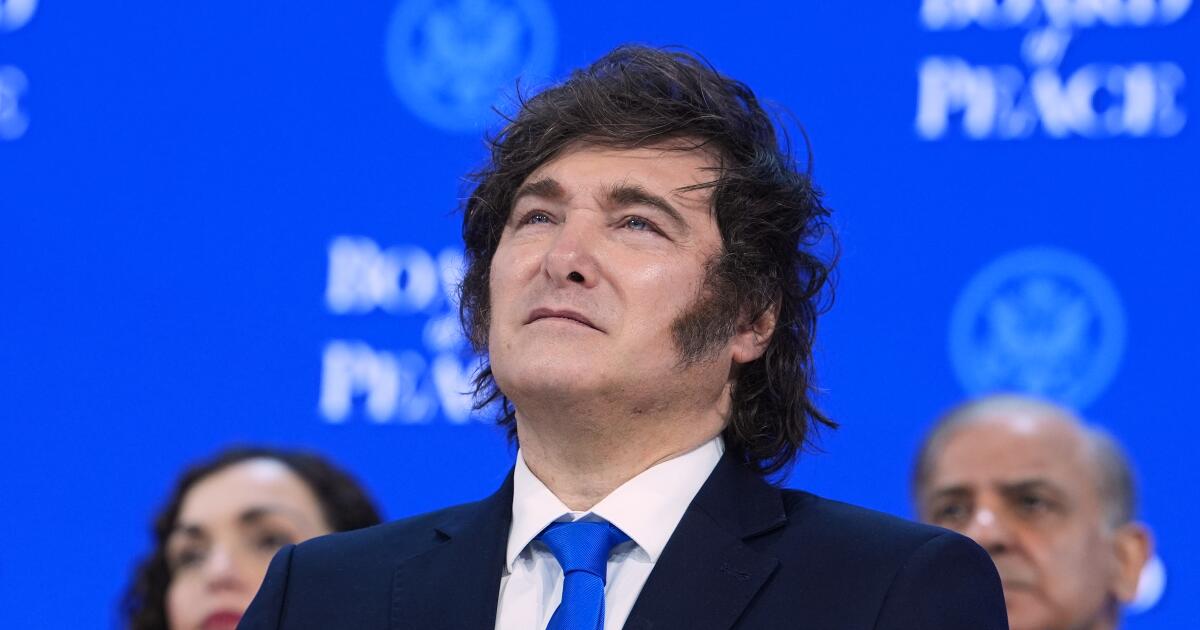Argentina and U.S. sign free trade deal in breakthrough for Milei
BUENOS AIRES — Argentina and the United States said they reached an expansive trade deal Thursday, boosting President Javier Milei as he moves to open up the South American nation’s notoriously protectionist economy and reflecting the close alliance between the radical libertarian and President Trump.
Argentina’s foreign minister, Pablo Quirno, posted a selfie on social media showing him and several diplomats beaming after emerging from a meeting in Washington where he said they’d signed the pact.
“Congratulations to our team and thanks to the U.S. Trade Representative’s team for building this great agreement together,” Quirno wrote. The Office of the U.S. Trade Representative also confirmed the deal.
The countries announced a framework for the agreement in November, saying Argentina would ease restrictions on a range of American imports, including cattle, dairy products, medicines, chemicals, machinery, medical devices and vehicles. Those were key concessions for Argentina, where local industries long protected by steep tariffs have expressed concern about their ability to compete with American manufacturers.
The U.S., for its part, would remove reciprocal tariffs on imports of “certain unavailable natural resources” and ingredients for pharmaceutical goods from Argentina, according to the framework.
At the time, the White House reached similar frameworks with Ecuador, Guatemala and El Salvador — part of what it described as an effort to improve the ability of American firms to sell industrial and agricultural products in Latin American countries and bring down food prices for U.S. consumers.
Officials did not immediately offer details about the final version of the U.S.-Argentina deal signed Thursday.
The agreement marks the latest development in the close alliance between Trump and Milei, who has reshaped Argentine foreign policy to align with the U.S., earned Trump’s praise for stabilizing his nation’s crisis-prone economy and traveled to the U.S. more than a dozen times in the last two years. Milei is scheduled to appear at Trump’s Mar-a-Lago estate next week to speak at a gala.
Trump supported Milei’s fiscal program last year with a $20-billion credit line that succeeded in calming markets and boosting Milei’s prospects in a crucial midterm election in October. The U.S. Treasury also directly purchased U.S. dollar-denominated Argentine bonds that ratings agencies were classifying as “junk” at the time and snapped up the volatile local currency that Argentines were dumping in droves.
The extraordinary intervention drew backlash from across the U.S. political spectrum.
Trump’s MAGA base questioned the need to bail out a far-flung country that’s not only of little importance to the U.S. but also directly competes with its exports of corn, wheat, meat and oil.
Democratic lawmakers expressed outrage that Trump was staking taxpayer money on a political gift to an ideological soulmate.
That criticism has continued, with U.S. Sen. Elizabeth Warren of Massachusetts, the top Democrat on the Senate Banking Committee, on Thursday appealing to Treasury Secretary Scott Bessent to end the $20-billion lifeline.
In a letter, she wrote that even though the Treasury promised its credit line for Argentina “was for an acute, short-term, and urgent purpose, it appears … to have left open the possibility of continued use.”
Debre writes for the Associated Press. AP writer Josh Boak in Washington contributed to this report.
